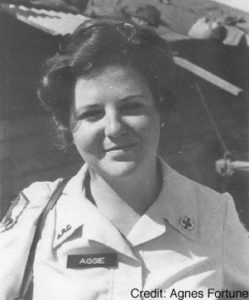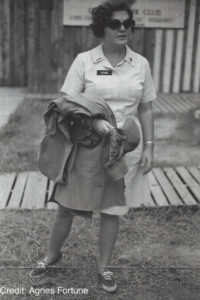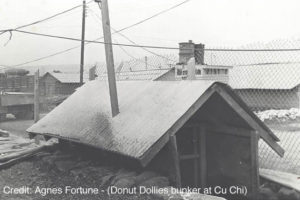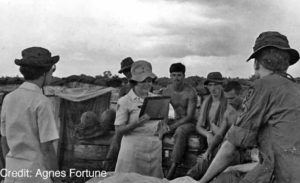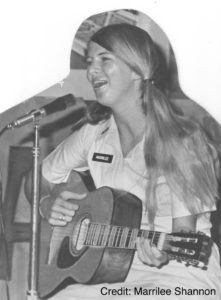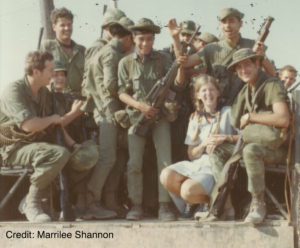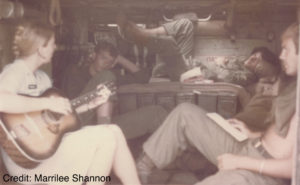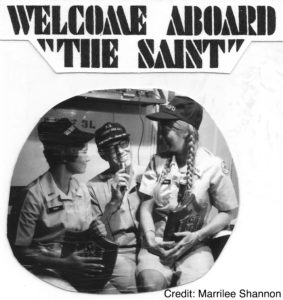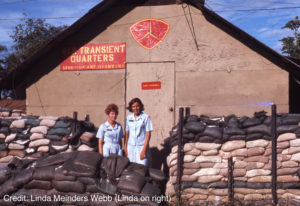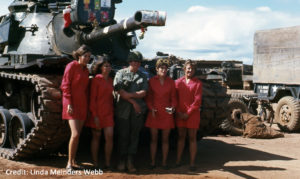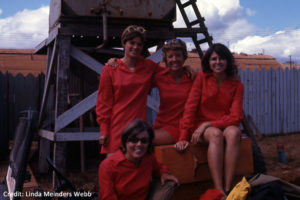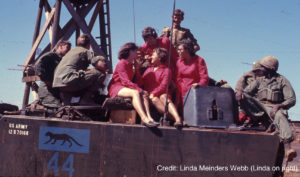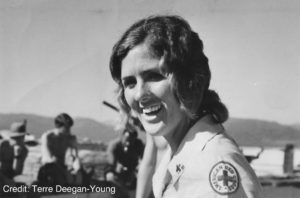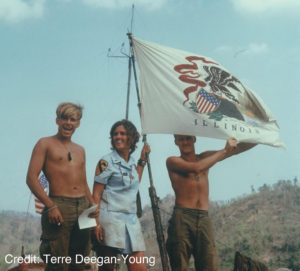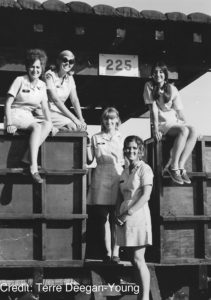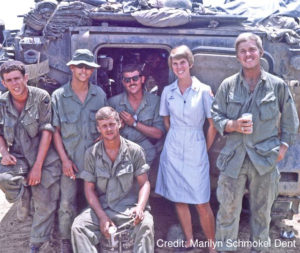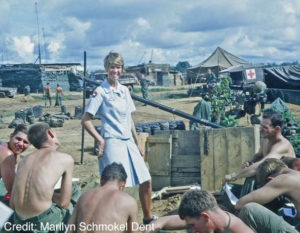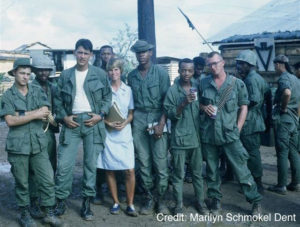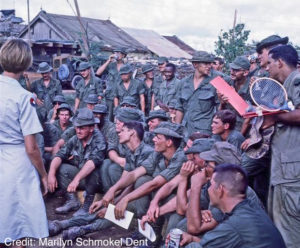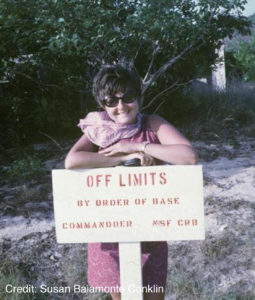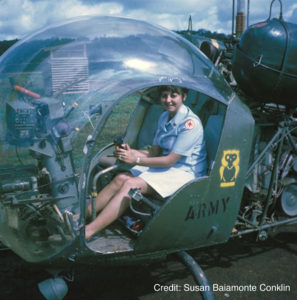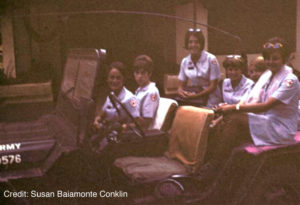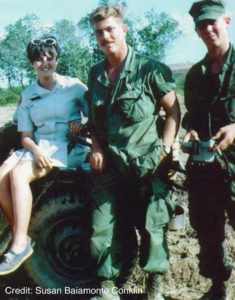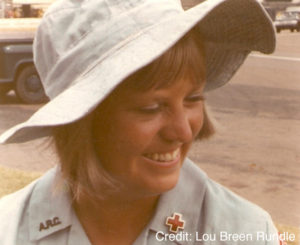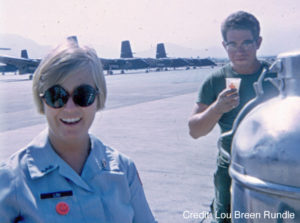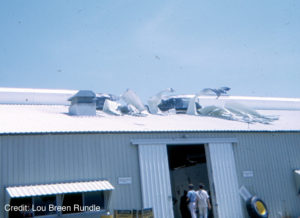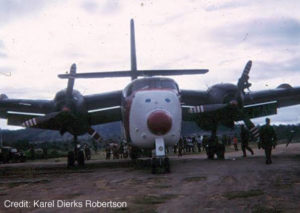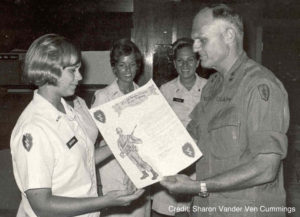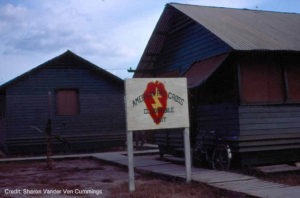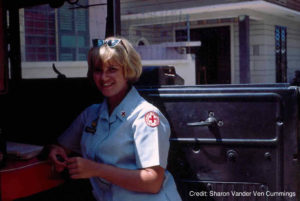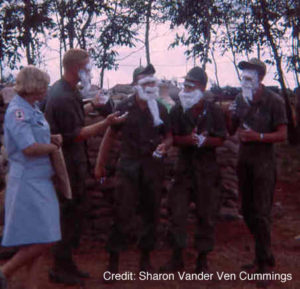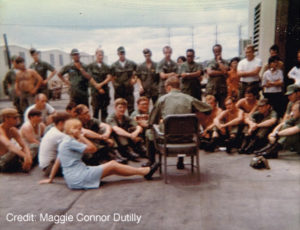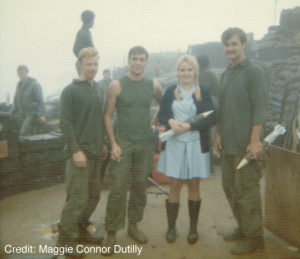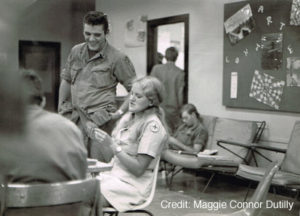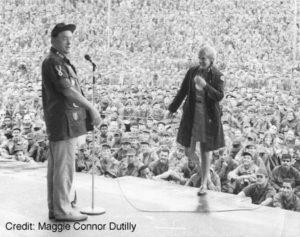In our Twentieth edition of the Donut Dollie Detail, Eileen O’Neill tells how being an international relations major and dating a GI prompted her to join the Red Cross SRAO program in Vietnam, how she had her worst scare when the helicopter she was flying in was nearly downed, and how in just 5 days of returning home from Vietnam, she was back at grad school.
Please share the Donut Dollie Detail with family, friends and veterans you may know, and make sure to like/follow us on Facebook to learn when the next edition is posted. You can also share your email address with us at list@donutdollies.com for updates on the upcoming release of the Donut Dollies Documentary (we will not share/sell your email and will only use it for Donut Dollie related updates).
Please meet Red Cross Donut Dollie Eileen O’Neill…
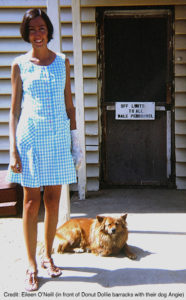 What prompted you to join the SRAO (Supplemental Recreation Activities Overseas) program and want to go to Vietnam?
What prompted you to join the SRAO (Supplemental Recreation Activities Overseas) program and want to go to Vietnam?
I had been an undergraduate at George Washington University in D.C. from 1966-70, so I had a front seat to all the demonstrations and discussions about the Vietnam War. Also, since I was an international relations major, I had a natural interest in foreign policy. For almost 3 years, I dated a GI who I had met at the end of my freshman year; he was in Vietnam 1968-69. All of this reinforced my connection to Vietnam.
I actually didn’t know anything about the SRAO program until the summer after I graduated. I met a woman who was going to Vietnam and thought the program sounded fascinating. I love to travel and this seemed like a tremendous adventure, with the advantage of letting me see Vietnam for myself. I interviewed with the understanding that I couldn’t leave school until the end of the semester (I had started my Master’s degree) and was hired for the SRAO class in January, 1971. I took a year’s leave of absence from grad school and then told my parents.
When and where were you stationed in Vietnam? Did you go by a nickname?
I was in the January, 1971 class, but by the time we got to Saigon after our training it was early February. My first base was Danang; I was there until the first of July. My second base was Phan Rang Air Base in the center of the country and I was there until the first part of September. However, in the two months at Phan Rang, I had two TDYs of a week each, one at Bien Hoa (relatively close to Saigon) and one at Binh Thuy in the Delta. Early in September I moved to Binh Thuy as Unit Director and was there until I left in January, 1972. I was known as Eileen, and didn’t go by a nickname in Vietnam.
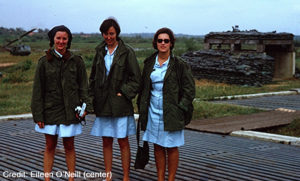 What was a routine day like in Vietnam?
What was a routine day like in Vietnam?
There was a “routine day” in some units, but there was a lot of variety also. In Danang, one of our largest units, we had a recreation center and three to four “runs” each day. Maybe 3 or 4 girls would be in the rec center, putting on pool or pingpong tournaments, playing cards or other games with the guys, or just talking. We had regular “runs” set up: we’d visit such-and-such unit at a certain time on a certain day, try to get to such-and-such firebase each week or two at a particular time/day. It was easier to set up a schedule for the units based around Danang; for the firebases, it depended on weather (we almost always flew to them), military action, etc. On the runs, we’d generally spend an hour or so with the guys doing a program and talking. The programs were really just an excuse to get the guys to talk with us. We designed the programs with a variety of components, usually starting with an introductory fast-paced game. We’d usually try to have a “theme”, which could be anything. Lots of the programs dealt with sports and music. Sometimes we’d build a Jeopardy board with questions based on the theme. We found that if we divided the guys into teams, their competitive spirit would draw them in. They’d often joke about our silly games, but they certainly were willing to try to win.
In Phan Rang, we had only a few runs, so our work was concentrated on our rec center. We had a small unit, usually about 6 girls. As in Danang, we had tournaments, a music room, card games, etc.
In Binh Thuy, we had anything but routine days. The US military in the Delta was gradually drawing down by late 1971, so regular units were fewer and small units of advisors were more common. We didn’t have a rec center, so we were completely mobile. We did have some regularly scheduled runs to the units around Binh Thuy and in a few other spots. Our primary work however was visiting advisor units. These men were a little bit older than the 18-20 year olds we normally saw. Often, we spent more time just talking to them, perhaps playing cards, visiting the villages near where they worked.
Did you ever have any “close calls” either on base or in any vehicles?
Most of the time I had that sense of invulnerability that one has at the age of 21. There were a few times when choppers were shot at from the ground – rather foolishly, because we were way too high at the time to be hit. Same was true of ground vehicles – too far away to really be a threat. Once we had a fairly long flight in a chopper and the weather was bad…and then got worse. The chopper was being tossed around; the pilot finally gave up and set us down on a road and waited for the weather to clear enough to fly again (hoping that Charlie wasn’t out there). One of the worst scares came from a chopper pilot in the Delta. He was hotdogging and showing off for the Red Cross girls by low-leveling along an old canal. He suddenly had to pull up very sharply since there was a wire stretched between two trees, a trick Charlie used to down choppers. His gunners were furious with him.
Were you ever injured while in Vietnam?
A number of girls sprained or broke something while in-country. I didn’t think of mine as an “injury” per se; that was a term for the guys. In my case, a Chinook (one of the big double-rotor choppers) took off too soon after letting us off back near our barracks. It was an old trick pilots used to blow our skirts up in our faces. Unfortunately, it also blew our prop bag, which had an unusually heavy board game in it, into my ankles, sending me head over heels. I landed so hard that I pulled a muscle off my groin and broke my wrist. Initially I thought I’d be in a cast for a month; Saigon headquarters agreed to let me stay in-country. After a month, they found I’d need to be in a cast for another 5 months. It was a pain in the neck, but it also was a great conversation starter. Guys would come up and ask me what happened. I felt very lucky to be allowed to stay in country.
What was it like to visit the soldiers in the hospitals?
It was a mixed bag – for the guys who were doing well, we could talk and joke around; they were always so appreciative. It was much more difficult if the guys were badly hurt; we tried to keep our smiles on, but it would be difficult. We just tried to let them know that we cared, without letting any tears slip out. My worst experience – and the most moving – was in Danang visiting the USS Sanctuary (a Naval Hospital). They were trying to stabilize a few guys so they could fly them to Japan. I remember one of them probably wasn’t going to make it. We went through a “psych ward” where the guys simply weren’t in the real world any more. They weren’t malingering; their minds simply couldn’t handle it anymore. These were cases of traumatic stress at its worst; I’ve always wondered whether the doctors were ever able to put some of them back together mentally.
How was the transition returning home to the United States?
I landed at Travis Airport on Wednesday, flew to my parents’ home in Denver on Thursday, found out the University calendar had been moved forward a week, flew to DC on Sunday and started back at grad school on Monday. I stayed with family friends a couple weeks while I found an apartment and a part-time job. This was the worst culture shock of my life. Being back in the States was weird, anyway; everything seemed superficial. Students were worrying about dates, grades, what to wear, etc., when I’d just been in a place where life-and-death decisions were being made. Being in DC, there were occasional choppers flying overhead; I’d automatically look up – I could locate where it was and what kind of chopper. There were also 21-gun salutes for visiting heads of state; I almost ended up under my desk a couple of times. I think I was lucky, however, to have had a very rigorous graduate program. It gave me something to do, which I enjoyed and kept me occupied; I would have floundered if I had come home without a job.
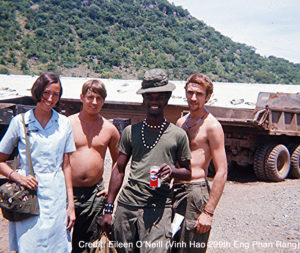 What would you like people to remember and understand most about the women who served?
What would you like people to remember and understand most about the women who served?
Most people have no idea that we were even there. I don’t want people to look at us as heroes; we weren’t. We were just young women doing a job that was amazing and different from anything else (true of both Vietnam and Korea). It was a unique group in a program that couldn’t have existed elsewhere; the guys in Vietnam and Korea were really isolated. It also wasn’t just a bunch of girls playing silly games and having fun in a war zone. We were all college graduates, a little bit older (not much) than the average GI. We were there to boost morale and to provide “a touch of home”, showing that people cared about them. We had to keep our own feelings hidden; we couldn’t have a “down” day. It was more difficult than it sounds.
How do you feel Veterans think of your time having served with them? Have any Veterans expressed their feelings to you directly?
A few have – many times we get a “Welcome home” from vets. Many have noted that they didn’t see any Donut Dollies anywhere in-country; I usually try to explain that there were only 627 of us from late 1965-1972 for the whole country. At the most, I think there were only about 120 Donut Dollies in-country at any one time.
What are your fondest or most interesting memories of your time serving in Vietnam?
Far too many to relate – and most of them involve the GIs. Often, they were so shy around us; some were actually tongue-tied and could hardly talk to us. Once our chopper had to make an unscheduled stop, which was a few hundred yards from some guys working; while we were waiting, two guys got up their courage to come over to talk to us. They could hardly say anything; finally, one of them asked if they could just hold our hands. So we sat at the edge of the Huey and held hands with them while we talked. The one guy said, “This is so cool!”
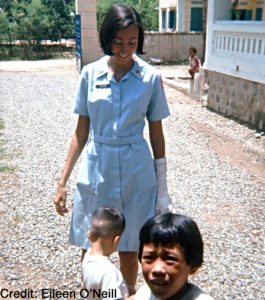 One day a couple guys in Danang asked me to go with them to one of the orphanages. We did this occasionally on our days off, although this was a different orphanage than we usually went to. The orphanage had a babies’ room; one of the men, a tough-as-nails Sergeant, told me he couldn’t go in there because he just couldn’t handle it. When I asked why, he told me I’d find out. I went in with his Captain and was devastated by the sight of a couple dozen cribs with tiny infants, most too listless to cry. These two guys visited every chance they got, one holding the infants, the other playing with the small children.
One day a couple guys in Danang asked me to go with them to one of the orphanages. We did this occasionally on our days off, although this was a different orphanage than we usually went to. The orphanage had a babies’ room; one of the men, a tough-as-nails Sergeant, told me he couldn’t go in there because he just couldn’t handle it. When I asked why, he told me I’d find out. I went in with his Captain and was devastated by the sight of a couple dozen cribs with tiny infants, most too listless to cry. These two guys visited every chance they got, one holding the infants, the other playing with the small children.
PLEASE NOTE: THERE ARE 19 PREVIOUS EDITIONS OF THE DONUT DOLLIE DETAIL THAT CAN BE SEEN HERE, JUST SCROLL DOWN TO READ EACH (AT THE BOTTOM, YOU’LL SEE A LINK TO GO TO THE NEXT PAGE OF DONUT DOLLIE DETAIL FEATURES)

